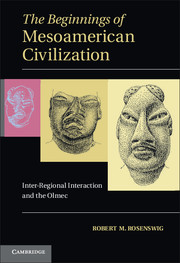Book contents
- Frontmatter
- Contents
- Figures
- Tables
- Acknowledgments
- SECTION I AN EARLY FORMATIVE MESOAMERICAN PROBLEM
- 1 Introduction
- 2 Knowledge in an Archipelago of Complexity
- 3 Mesoamerica's First Style Horizons and the “Olmec Problem”
- SECTION II ARCHAEOLOGICAL DATA
- SECTION III DERIVING MEANING FROM THE ARCHAEOLOGICAL RECORD
- 9 Conclusion
- Appendix 1 Temporally secure excavation contexts at Cuauhtémoc with detailed ceramic data
- Appendix 2 Temporally secure excavation contexts at Cuauhtémoc without detailed ceramic data
- References Cited
- Index
2 - Knowledge in an Archipelago of Complexity
Published online by Cambridge University Press: 26 February 2010
- Frontmatter
- Contents
- Figures
- Tables
- Acknowledgments
- SECTION I AN EARLY FORMATIVE MESOAMERICAN PROBLEM
- 1 Introduction
- 2 Knowledge in an Archipelago of Complexity
- 3 Mesoamerica's First Style Horizons and the “Olmec Problem”
- SECTION II ARCHAEOLOGICAL DATA
- SECTION III DERIVING MEANING FROM THE ARCHAEOLOGICAL RECORD
- 9 Conclusion
- Appendix 1 Temporally secure excavation contexts at Cuauhtémoc with detailed ceramic data
- Appendix 2 Temporally secure excavation contexts at Cuauhtémoc without detailed ceramic data
- References Cited
- Index
Summary
On the pretext of saving the producers the trouble and risk of exchange, of finding distant markets for their products, [traders] thus become the most useful class in society…amass enormous wealth and corresponding social influence, and for this reason are destined to reap ever new honors.
Engels 1972[1891]: 210In this chapter, I explore the political behavior entailed by long-distance ties between early complex societies. I propose that it is productive to explore the evolution of early Mesoamerican societies from a core/periphery perspective, distinct from the World-systems approach (Wallerstein, 1974) from which it is derived. I then present a discussion of inter-regional interaction inspired by Mauss's (1990) original formulation of the long-term meaning of gift giving and Malinowski's (1922, 1935) classic Trobriand ethnography that defined kula exchange. My goal is to explore the behaviors that are implied when archaeologists document the trade of objects and sharing of ideas over long distances. Mary Helms's (1979, 1993a) model for the local political salience of knowledge acquired from distant sources is reviewed, and the commonly documented quest for arcane knowledge is discussed. I argue that any study of exchange should give weight both to the movement of material goods and the ideas that accompany them. The movement of potentially prestigious ideas and concepts (or those that are desirable in some way) over long distances I call a “knowledge kula.” As such, ideas/concepts can move across long distances and be exchanged between elites, and they can remain tied to specific individuals or particular places.
- Type
- Chapter
- Information
- The Beginnings of Mesoamerican CivilizationInter-Regional Interaction and the Olmec, pp. 13 - 46Publisher: Cambridge University PressPrint publication year: 2009



